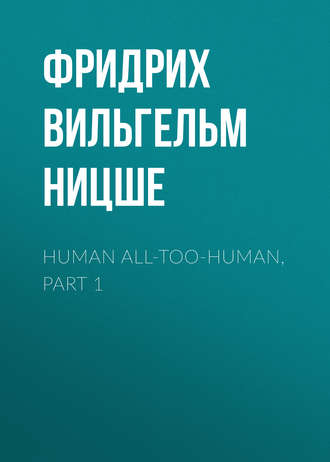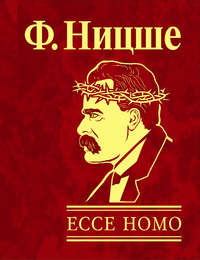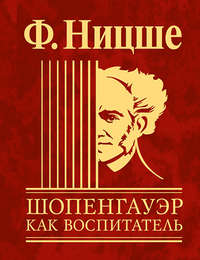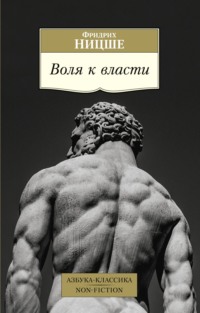 полная версия
полная версияHuman All-Too-Human, Part 1
Ceterum Censeo.– It is laughable when a company of paupers decree the abolition of the right of inheritance, and it is not less laughable when childless persons labour for the practical law-giving of a country: they have not enough ballast in their ship to sail safely over the ocean of the future. But it seems equally senseless if a man who has chosen for his mission the widest knowledge and estimation of universal existence, burdens himself with personal considerations for a family, with the support, protection, and care of wife and child, and in front of his telescope hangs that gloomy veil through which hardly a ray from the distant firmament can penetrate. Thus I, too, agree with the opinion that in matters of the highest philosophy all married men are to be suspected.
437Finally. – There are many kinds of hemlock, and fate generally finds an opportunity to put a cup of this poison to the lips of the free spirit, – in order to "punish" him, as every one then says. What do the women do about him then? They cry and lament, and perhaps disturb the sunset-calm of the thinker, as they did in the prison at Athens. "Oh Crito, bid some one take those women away!" said Socrates at last.
EIGHTH DIVISION
A GLANCE AT THE STATE
438Asking to Be Heard. – The demagogic disposition and the intention of working upon the masses is at present common to all political parties; on this account they are all obliged to change their principles into great al fresco follies and thus make a show of them. In this matter there is no further alteration to be made: indeed, it is superfluous even to raise a finger against it; for here Voltaire's saying applies: "Quand la populace se mêle de raisonner, tout est perdu." Since this has happened we have to accommodate ourselves to the new conditions, as we have to accommodate ourselves when an earthquake has displaced the old boundaries and the contour of the land and altered the value of property. Moreover, when it is once for all a question in the politics of all parties to make life endurable to the greatest possible majority, this majority may always decide what they understand by an endurable life; if they believe their intellect capable of finding the right means to this end why should we doubt about it? They want, once for all, to be the architects of their own good or ill fortune; and if their feeling of free choice and their pride in the five or six ideas that their brain conceals and brings to light, really makes life so agreeable to them that they gladly put up with the fatal consequences of their narrow-mindedness, there is little to object to, provided that their narrow-mindedness does not go so far as to demand that everything shall become politics in this sense, that all shall live and act according to this standard. For, in the first place, it must be more than ever permissible for some people to keep aloof from politics and to stand somewhat aside. To this they are also impelled by the pleasure of free choice, and connected with this there may even be some little pride in keeping silence when too many, and only the many, are speaking. Then this small group must be excused if they do not attach such great importance to the happiness of the majority (nations or strata of population may be understood thereby), and are occasionally guilty of an ironical grimace; for their seriousness lies elsewhere, their conception of happiness is quite different, and their aim cannot be encompassed by every clumsy hand that has just five fingers. Finally, there comes from time to time – what is certainly most difficult to concede to them, but must also be conceded – a moment when they emerge from their silent solitariness and try once more the strength of their lungs; they then call to each other like people lost in a wood, to make themselves known and for mutual encouragement; whereby, to be sure, much becomes audible that sounds evil to ears for which it is not intended. Soon, however, silence again prevails in the wood, such silence that the buzzing, humming, and fluttering of the countless insects that live in, above, and beneath it, are again plainly heard.
439Culture and Caste. – A higher culture can only originate where there are two distinct castes of society: that of the working class, and that of the leisured class who are capable of true leisure; or, more strongly expressed, the caste of compulsory labour and the caste of free labour. The point of view of the division of happiness is not essential when it is a question of the production of a higher culture; in any case, however, the leisured caste is more susceptible to suffering and suffer more, their pleasure in existence is less and their task is greater. Now supposing there should be quite an interchange between the two castes, so that on the one hand the duller and less intelligent families and individuals are lowered from the higher caste into the lower, and, on the other hand, the freer men of the lower caste obtain access to the higher, a condition of things would be attained beyond which one can only perceive the open sea of vague wishes. Thus speaks to us the vanishing voice of the olden time; but where are there still ears to hear it?
440Of Good Blood. – That which men and women of good blood possess much more than others, and which gives them an undoubted right to be more highly appreciated, are two arts which are always increased by inheritance: the art of being able to command, and the art of proud obedience. Now wherever commanding is the business of the day (as in the great world of commerce and industry), there results something similar to these families of good blood, only the noble bearing in obedience is lacking which is an inheritance from feudal conditions and hardly grows any longer in the climate of our culture.
441Subordination. – The subordination which is so highly valued in military and official ranks will soon become as incredible to us as the secret tactics of the Jesuits have already become; and when this subordination is no longer possible a multitude of astonishing results will no longer be attained, and the world will be all the poorer. It must disappear, for its foundation is disappearing, the belief in unconditional authority, in ultimate truth; even in military ranks physical compulsion is not sufficient to produce it, but only the inherited adoration of the princely as of something superhuman. In freer circumstances people subordinate themselves only on conditions, in compliance with a mutual contract, consequently with all the provisos of self-interest.
442The National Army. – The greatest disadvantage of the national army, now so much glorified, lies in the squandering of men of the highest civilisation; it is only by the favourableness of all circumstances that there are such men at all; how carefully and anxiously should we deal with them, since long periods are required to create the chance conditions for the production of such delicately organised brains! But as the Greeks wallowed in the blood of Greeks, so do Europeans now in the blood of Europeans: and indeed, taken relatively, it is mostly the highly cultivated who are sacrificed, those who promise an abundant and excellent posterity; for such stand in the front of the battle as commanders, and also expose themselves to most danger, by reason of their higher ambition. At present, when quite other and higher tasks are assigned than patria and honor, the rough Roman patriotism is either something dishonourable or a sign of being behind the times.
443Hope As Presumption. – Our social order will slowly melt away, as all former orders have done, as soon as the suns of new opinions have shone upon mankind with a new glow. We can only wish this melting away in the hope thereof, and we are only reasonably entitled to hope when we believe that we and our equals have more strength in heart and head than the representatives of the existing state of things. As a rule, therefore, this hope will be a presumption, an over-estimation.
444War. – Against war it may be said that it makes the victor stupid and the vanquished revengeful. In favour of war it may be said that it barbarises in both its above-named results, and thereby makes more natural; it is the sleep or the winter period of culture; man emerges from it with greater strength for good and for evil.
445In the Prince's Service. – To be able to act quite regardlessly it is best for a statesman to carry out his work not for himself but for a prince. The eye of the spectator is dazzled by the splendour of this general disinterestedness, so that it does not see the malignancy and severity which the work of a statesman brings with it.17
446A Question of Power, Not of Right. – As regards Socialism, in the eyes of those who always consider higher utility, if it is really a rising against their oppressors of those who for centuries have been oppressed and downtrodden, there is no problem of right involved (notwithstanding the ridiculous, effeminate question," How far ought we to grant its demands?") but only a problem of power; the same, therefore, as in the case of a natural force, – steam, for instance, – which is either forced by man into his service, as a machine-god, or which, in case of defects of the machine, that is to say, defects of human calculation in its construction, destroys it and man together. In order to solve this question of power we must know how strong Socialism is, in what modification it may yet be employed as a powerful lever in the present mechanism of political forces; under certain circumstances we should do all we can to strengthen it. With every great force – be it the most dangerous – men have to think how they can make of it an instrument for their purposes. Socialism acquires a right only if war seems to have taken place between the two powers, the representatives of the old and the new, when, however, a wise calculation of the greatest possible preservation and advantageousness to both sides gives rise to a desire for a treaty. Without treaty no right. So far, however, there is neither war nor treaty on the ground in question, therefore no rights, no "ought."
447Utilising the Most Trivial Dishonesty. – The power of the press consists in the fact that every individual who ministers to it only feels himself bound and constrained to a very small extent. He usually expresses his opinion, but sometimes also does not express it in order to serve his party or the politics of his country, or even himself. Such little faults of dishonesty, or perhaps only of a dishonest silence, are not hard to bear by the individual, but the consequences are extraordinary, because these little faults are committed by many at the same time. Each one says to himself: "For such small concessions I live better and can make my income; by the want of such little compliances I make myself impossible." Because it seems almost morally indifferent to write a line more (perhaps even without signature), or not to write it, a person who has money and influence can make any opinion a public one. He who knows that most people are weak in trifles, and wishes to attain his own ends thereby, is always dangerous.
448Too Loud a Tone in Grievances. – Through the fact that an account of a bad state of things (for instance, the crimes of an administration, bribery and arbitrary favour in political or learned bodies) is greatly exaggerated, it fails in its effect on intelligent people, but has all the greater effect on the unintelligent (who would have remained indifferent to an accurate and moderate account). But as these latter are considerably in the majority, and harbour in themselves stronger will-power and more impatient desire for action, the exaggeration becomes the cause of investigations, punishments, promises, and reorganisations. In so far it is useful to exaggerate the accounts of bad states of things.
449The Apparent Weather – Makers of Politics. – Just as people tacitly assume that he who understands the weather, and foretells it about a day in advance, makes the weather, so even the educated and learned, with a display of superstitious faith, ascribe to great statesmen as their most special work all the important changes and conjunctures that have taken place during their administration, when it is only evident that they knew something thereof a little earlier than other people and made their calculations accordingly, – thus they are also looked upon as weather-makers – and this belief is not the least important instrument of their power.
450New and Old Conceptions of Government. – To draw such a distinction between Government and people as if two separate spheres of power, a stronger and higher, and a weaker and lower, negotiated and came to terms with each other, is a remnant of transmitted political sentiment, which still accurately represents the historic establishment of the conditions of power in most States. When Bismarck, for instance, describes the constitutional system as a compromise between Government and people, he speaks in accordance with a principle which has its reason in history (from whence, to be sure, it also derives its admixture of folly, without which nothing human can exist). On the other hand, we must now learn – in accordance with a principle which has originated only in the brain and has still to make history – that Government is nothing but an organ of the people, – not an attentive, honourable "higher" in relation to a "lower" accustomed to modesty. Before we accept this hitherto unhistorical and arbitrary, although logical, formulation of the conception of Government, let us but consider its consequences, for the relation between people and Government is the strongest typical relation, after the pattern of which the relationship between teacher and pupil, master and servants, father and family, leader and soldier, master and apprentice, is unconsciously formed. At present, under the influence of the prevailing constitutional system of government, all these relationships are changing a little, – they are becoming compromises. But how they will have to be reversed and shifted, and change name and nature, when that newest of all conceptions has got the upper hand everywhere in people's minds! – to achieve which, however, a century may yet be required. In this matter there is nothing further to be wished for except caution and slow development.
451Justice As the Decoy-cry of Parties. – Well may noble (if not exactly very intelligent) representatives of the governing classes asseverate: "We will treat men equally and grant them equal rights"; so far a socialistic mode of thought which is based on justice is possible; but, as has been said, only within the ranks of the governing class, which in this case practises justice with sacrifices and abnegations. On the other hand, to demand equality of rights, as do the Socialists of the subject caste, is by no means the outcome of justice, but of covetousness. If you expose bloody pieces of flesh to a beast, and withdraw them again, until it finally begins to roar, do you think that roaring implies justice?
452Possession and Justice. – When the Socialists point out that the division of property at the present day is the consequence of countless deeds of injustice and violence, and, in summa, repudiate obligation to anything with so unrighteous a basis, they only perceive something isolated. The entire past of ancient civilisation is built up on violence, slavery, deception, and error; we, however, cannot annul ourselves, the heirs of all these conditions, nay, the concrescences of all this past, and are not entitled to demand the withdrawal of a single fragment thereof. The unjust disposition lurks also in the souls of non-possessors; they are not better than the possessors and have no moral prerogative; for at one time or another their ancestors have been possessors. Not forcible new distributions, but gradual transformations of opinion are necessary; justice in all matters must become greater, the instinct of violence weaker.
453The Helmsman of the Passions. – The statesman excites public passions in order to have the advantage of the counter-passions thereby aroused. To give an example: a German statesman knows quite well that the Catholic Church will never have the same plans as Russia; indeed, that it would far rather be allied with the Turk than with the former country; he likewise knows that Germany is threatened with great danger from an alliance between France and Russia. If he can succeed, therefore, in making France the focus and fortress of the Catholic Church, he has averted this danger for a lengthy period. He has, accordingly, an interest in showing hatred against the Catholics in transforming, by all kinds of hostility, the supporters of the Pope's authority into an impassioned political power which is opposed to German politics, and must, as a matter of course, coalesce with France as the adversary of Germany; his aim is the catholicising of France, just as necessarily as Mirabeau saw the salvation of his native land in de-catholicising it. The one State, therefore, desires to muddle millions of minds of another State in order to gain advantage thereby. It is the same disposition which supports the republican form of government of a neighbouring State —le désordre organisé, as Mérimée says – for the sole reason that it assumes that this form of government makes the nation weaker, more distracted, less fit for war.
454The Dangerous Revolutionary Spirits. – Those who are bent on revolutionising society may be divided into those who seek something for themselves thereby and those who seek something for their children and grandchildren. The latter are the more dangerous, for they have the belief and the good conscience of disinterestedness. The others can be appeased by favours: those in power are still sufficiently rich and wise to adopt that expedient. The danger begins as soon as the aims become impersonal; revolutionists seeking impersonal interests may consider all defenders of the present state of things as personally interested, and may therefore feel themselves superior to their opponents.
455The Political Value of Paternity. – When a man has no sons he has not a full right to join in a discussion concerning the needs of a particular community. A person must himself have staked his dearest object along with the others: that alone binds him fast to the State; he must have in view the well-being of his descendants, and must, therefore, above all, have descendants in order to take a right and natural share in all institutions and the changes thereof. The development of higher morality depends on a person's having sons; it disposes him to be un-egoistic, or, more correctly, it extends his egoism in its duration and permits him earnestly to strive after goals which lie beyond his individual lifetime.
456Pride of Descent. – A man may be justly proud of an unbroken line of good ancestors down to his father, – not however of the line itself, for every one has that. Descent from good ancestors constitutes the real nobility of birth; a single break in the chain, one bad ancestor, therefore, destroys the nobility of birth. Every one who talks about his nobility should be asked: "Have you no violent, avaricious, dissolute, wicked, cruel man amongst your ancestors?" If with good cognisance and conscience he can answer No, then let his friendship be sought.
457Slaves and Labourers. – The fact that we regard the gratification of vanity as of more account than all other forms of well-being (security, position, and pleasures of all sorts), is shown to a ludicrous extent by every one wishing for the abolition of slavery and utterly abhorring to put any one into this position (apart altogether from political reasons), while every one must acknowledge to himself that in all respects slaves live more securely and more happily than modern labourers, and that slave labour is very easy labour compared with that of the "labourer." We protest in the name of the "dignity of man"; but, expressed more simply, that is just our darling vanity which feels non-equality, and inferiority in public estimation, to be the hardest lot of all. The cynic thinks differently concerning the matter, because he despises honour: – and so Diogenes was for some time a slave and tutor.
458Leading Minds and Their Instruments. – We see that great statesmen, and in general all who have to employ many people to carry out their plans, sometimes proceed one way and sometimes another; they either choose with great skill and care the people suitable for their plans, and then leave them a comparatively large amount of liberty, because they know that the nature of the persons selected impels them precisely to the point where they themselves would have them go; or else they choose badly, in fact take whatever comes to hand, but out of every piece of clay they form something useful for their purpose. These latter minds are the more high-handed; they also desire more submissive instruments; their knowledge of mankind is usually much smaller, their contempt of mankind greater than in the case of the first mentioned class, but the machines they construct generally work better than the machines from the workshops of the former.
459Arbitrary Law Necessary. – Jurists dispute whether the most perfectly thought-out law or that which is most easily understood should prevail in a nation. The former, the best model of which is Roman Law, seems incomprehensible to the layman, and is therefore not the expression of his sense of justice. Popular laws, the Germanic, for instance, have been rude, superstitious, illogical, and in part idiotic, but they represented very definite, inherited national morals and sentiments. But where, as with us, law i no longer custom, it can only command and be compulsion; none of us any longer possesses a traditional sense of justice; we must therefore content ourselves with arbitrary laws, which are the expressions of the necessity that there must be law. The most logical is then in any case the most acceptable, because it is the most impartial, granting even that in every case the smallest unit of measure in the relation of crime and punishment is arbitrarily fixed.
460The Great Man of the Masses. – The recipe for what the masses call a great man is easily given. In all circumstances let a person provide them with something very pleasant, or first let him put it into their heads that this or that would be very pleasant, and then let him give it to them. On no account give it immediately, however: but let him acquire it by the greatest exertions, or seem thus to acquire it. The masses must have the impression that there is a powerful, nay indomitable strength of will operating; at least it must seem to be there operating. Everybody admires a strong will, because nobody possesses it, and everybody says to himself that if he did possess it there would no longer be any bounds for him and his egoism. If, then, it becomes evident that such a strong will effects something very agreeable to the masses, instead of hearkening to the wishes of covetousness, people admire once more, and wish good luck to themselves. Moreover, if he has all the qualities of the masses, they are the less ashamed before him, and he is all the more popular. Consequently, he may be violent, envious, rapacious, intriguing, flattering, fawning, inflated, and, according to circumstances, anything whatsoever.
461Prince and God. – People frequently commune with their princes in the same way as with their God, as indeed the prince himself was frequently the Deity's representative, or at least His high priest. This almost uncanny disposition of veneration, disquiet, and shame, grew, and has grown, much weaker, but occasionally it flares up again, and fastens upon powerful persons generally. The cult of genius is an echo of this veneration of Gods and Princes. Wherever an effort is made to exalt particular men to the superhuman, there is also a tendency to regard whole grades of the population as coarser and baser than they really are.
462My Utopia. – In a better arranged society the heavy work and trouble of life will be assigned to those who suffer least through it, to the most obtuse, therefore; and so step by step up to those who are most sensitive to the highest and sublimest kinds of suffering, and who therefore still suffer notwithstanding the greatest alleviations of life.









